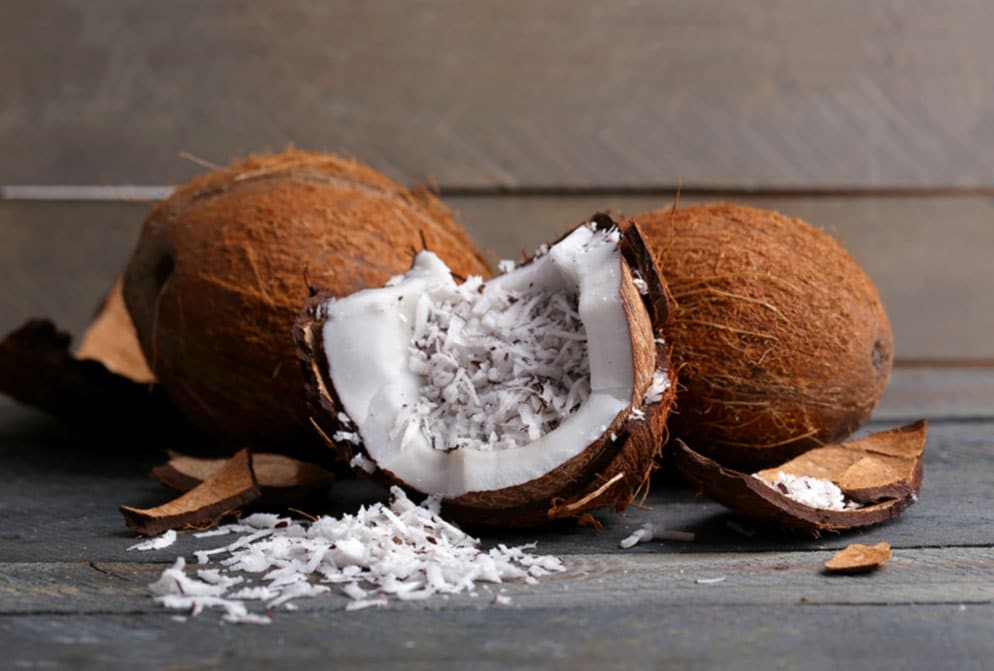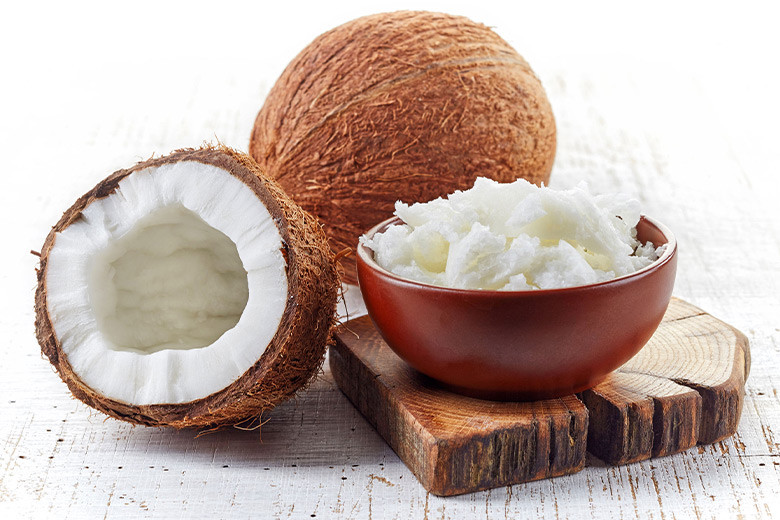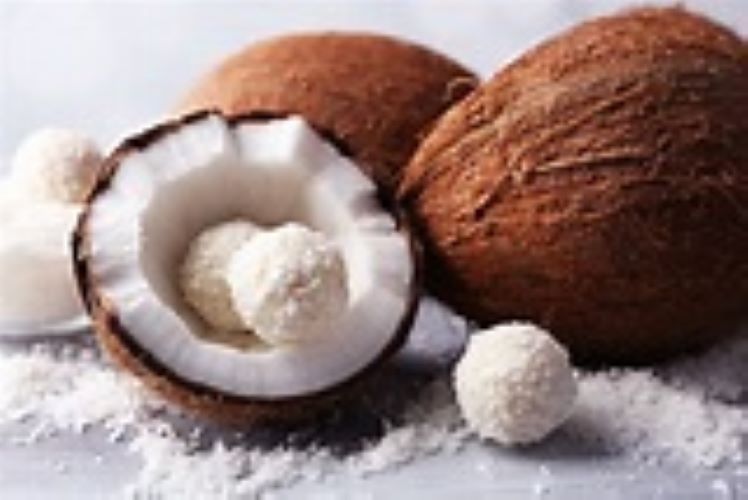Blog
The Incredible Benefits of Eating Coconut Flakes?

Introduction:
Few foods captivate the mind as much as coconut flakes do when it comes to their health-boosting potential and versatility. Coconut meat bits that have been carefully dried to keep their natural goodness have been loved for a long time for their delicious taste and great nutritional value. In addition to being tasty, coconut flakes are also very good for you because they are full of bioactive compounds and important nutrients that are good for your health.
This in-depth look at the many benefits of coconut flakes shows how they can help keep your heart healthy, give you more energy, help you lose weight, support digestive health, improve skin and hair health, boost your immune system, and keep your blood sugar levels in check.
Nutritional Profile of Coconut Flakes:
Before getting into the details of their health benefits, it’s important to know what nutrients are in coconut flakes. The delicious shreds come mostly from the meat of fully grown coconuts, which is grated and dried to make the familiar flakes we all know and love. If you look more closely at their nutrition facts, you’ll see that they are full of important nutrients like vitamins, minerals, healthy fats, and fiber.
A standard 100-gram amount of coconut flakes usually gives you:
• It has about 650 kcal of calories.
• About 6 grams of protein
• The fat is about 64 grams and mostly made up of medium-chain triglycerides (MCTs).
• About 24 grams of carbs, with dietary fiber making up a big part of that amount.
• Vitamins, such as vitamin C, vitamin E, vitamin B6, and different types of B vitamins
• Minerals: manganese, copper, selenium, and small amounts of iron and zinc
With such a high nutritional value, coconut flakes are a true nutritional powerhouse, providing a wide range of nutrients that are necessary for good health and vitality.
Health Benefits of Coconut Flakes:
1. Supports Heart Health: The heavy fat lauric acid found in coconut flakes has been linked to possible heart health benefits. Even though lauric acid is a saturated fat, it may help raise HDL (good) cholesterol levels. This will improve the ratio of HDL to LDL (bad) cholesterol and lower the risk of heart disease. Also, the medium-chain triglycerides (MCTs) that are common in coconut flakes have gotten a lot of attention because they might be able to improve lipid profiles by lowering levels of triglycerides and total cholesterol.
2. Boosts Energy Levels: MCTs, which are the main type of fat in coconut flakes, have special qualities that make them a good source of energy. Long-chain fatty acids need bile to be absorbed and moved through the bloodstream. MCTs, on the other hand, are quickly absorbed and sent straight to the liver, where they are turned into ketones, which the body and brain can use right away as fuel. Because MCTs are broken down quickly, they give you a quick and long-lasting energy boost. This makes coconut flakes a great choice for people who want to naturally boost their energy levels.
3. Helps with Weight Management: Eating dietary fats, especially MCTs, may actually help you lose weight and keep it off, which goes against what most people think. MCTs have been shown to make people feel fuller and satrier, which can help them eat fewer calories and lose more weight. Additionally, the thermogenic effect of MCTs—the energy used in breaking them down and metabolism—may help burn more calories and fat, which is another way they can help with weight control. People who want to reach and stay at a healthy weight may benefit from adding coconut flakes to their diet as part of a well-balanced meal plan.
4. Promotes Digestive Health: Fiber in your diet is very important for keeping your digestive system healthy, and coconut flakes have a lot of it. Coconut flakes help keep your bowels moving regularly, keep you from getting constipated, and support the growth of good bacteria in your gut. Each 100-gram dose has about 7 grams of dietary fiber. Also, the medium-chain fatty acids in coconut flakes, especially lauric acid, are antimicrobial. This means they may help fight harmful pathogens in the digestive system, which is good for overall digestive health.
5. Enhances Skin and Hair Health: The vitamin E in coconut flakes is a strong antioxidant that protects the skin from free radicals and other environmental factors that can damage it. So, eating coconut flakes on a regular basis may help keep your skin looking young and healthy and ease the signs of skin problems like dryness and inflammation. Because the fatty acids in coconut flakes (lauric acid and capric acid) keep hair moist, they are also a great natural way to nourish and condition hair, making it soft, shiny, and easy to handle.
6. Supports Immune Function: A powerful immune system organ allows the body to fight germs and remain or become healthy and lively. Coconut flakes are a rich source of many vitamins and minerals, such as selenium, vitamin C, and vitamin E, that play a crucial role in the working of the immune system and make the body’s natural defenses work even better. Vitamin C is well known as an antioxidant and for its ability to strengthen the work of immune cells. Unlike Vitamin E, Vitamin E is very good at clearing free radicals and protecting immune cells from damage caused by oxidation. People can strengthen their immune systems and make themselves less likely to get infections and diseases by adding coconut slices to their diet.
7. May Help Regulate Blood Sugar Levels: To be honest, they are high in carbohydrates, however, thanks to their low glycemic index (GI), they only lead to a slight rise in blood sugar levels when consumed. Therefore, coconut flakes are one of the best foods for people who want to regulate their blood sugar level, such as those with diabetes and insulin resistance. Other than that, dietary fiber in the coconut flakes regulates blood sugar since it retards the speed of glucose release into the body. This helps to control blood sugar fluctuations.
Incorporating Coconut Flakes into Your Diet:
• Add them to Smoothies and Yogurt: Sprinkle a handful of coconut flakes to your favorite smoothie or yoghurt for a more tropical version.
- Use them as Toppings: Add some coconut flakes to soups, oatmeal or cereal for some nice crunch and a hint of sweetness. In addition, you can sprinkle them to soups, stews, or curries to make them prettier and give them the taste of coconut.
- Put them in baked goods: Incorporate shredded coconut in your favorite baked goods such as muffins, cakes, cookies and granola bars to give them a nice coconut flavor and make them more nutritious. These coconut flakes improve the taste of baked products by adding flavors and flavorsome diversity. You can mix them with the dough or use it as a topping.
- Toast them and eat them as a snack: Roasted coconut bits have a rich crispy taste and make a perfect snack when eaten like that. Arrange the coconut flakes in a single layer on a tray and put them in the oven until they turn golden brown. They are a healthy snack you can have in between the meals.
- Use them in savory dishes too: Don’t only use coconut flakes in dessert, use them in savory dishes too for a new twist on the old ones. Coconut flakes are the key players in savory recipes when added to grain salads, roasted vegetables, or as a coating for fish or chicken. They improve the flavor and sophistication of the recipes. They lift them to the unmatched level of culinary artistry.
In conclusion:
Coconut flakes is a nutritional marvel which has tremendous health benefits covering a multitude of needs of the body. Among the health benefits of coconut flakes one can count, inter alia, protection of the heart, giving you energy, helping you lose weight, improving the health of your digestive system, making your skin and hair healthier, boosting the immune system, and keeping your blood sugar levels in balance. With coconut flakes, people get ingredients that they can use to take care of their bodies, start the path towards the healthy lifestyle and optimal health. They are delicious and can be prepared in many ways and are still full of healthy vitamins and minerals.
Here are 10 frequently asked question about The Incredible Benefits of Eating Coconut Flakes?
Q1: What are coconut flakes, and how are they made?
A1: Coconut flakes are thin slices of coconut meat that have been dried or toasted. They are made by grating the flesh of mature coconuts, which is then dried at a low temperature or toasted until they become crispy flakes.
Q2: What nutritional benefits do coconut flakes offer?
A2: Coconut flakes are rich in healthy fats, particularly medium-chain triglycerides (MCTs), which are known for their quick energy conversion in the body. They also provide dietary fiber, essential vitamins (such as B vitamins), and minerals like manganese and copper. Coconut flakes are also naturally low in sugar.
Q3: How can eating coconut flakes support heart health?
A3: Coconut flakes contain lauric acid, a type of healthy saturated fat that has been shown to increase good HDL cholesterol levels in the blood. The presence of MCTs can also support heart health by improving overall cholesterol profiles.
Q4: Are coconut flakes beneficial for those following a gluten-free diet?
A4: Yes, coconut flakes are naturally gluten-free, making them an excellent snack or ingredient for individuals with gluten intolerance or those following a gluten-free diet.
Q5: Can coconut flakes aid in weight management?
A5: Yes, coconut flakes can aid in weight management due to their high fiber content and healthy fats. Fiber promotes feelings of fullness, reducing overall calorie intake, and MCTs are believed to enhance the body’s ability to burn fat for energy.
Q6: How do coconut flakes contribute to improved digestion?
A6: Coconut flakes are a good source of dietary fiber, which adds bulk to the stool and helps prevent constipation. Fiber also supports a healthy digestive system by promoting regular bowel movements.
Q7: Are there any beauty benefits associated with consuming coconut flakes?
A7: Yes, the nutrients in coconut flakes can contribute to healthier hair and skin. The fatty acids in coconut support hair health, and the antioxidants in coconut can help combat free radicals, promoting a more youthful complexion.
Q8: Can coconut flakes boost energy levels?
A8: Yes, the MCTs in coconut flakes are easily digestible and quickly converted into energy by the body. Consuming coconut flakes can provide a natural and sustained energy boost, making them a great snack option for active individuals.
Q9: How can coconut flakes be incorporated into the daily diet?
A9: Coconut flakes can be sprinkled on cereals, yogurt, or salads for added texture and flavor. They can also be used in baking, cooking, or as a topping for smoothies and desserts. Additionally, coconut flakes can be eaten on their own as a crunchy and nutritious snack.
Q10: Are there any precautions to consider when consuming coconut flakes?
A10: While coconut flakes offer numerous health benefits, it’s essential to consume them in moderation due to their calorie content. Some individuals may also be allergic to coconut, so it’s advisable to consult a healthcare professional if you are unsure about including coconut flakes in your diet. Also, be mindful of added sugars in flavored coconut flakes, as they can increase the overall sugar content.





